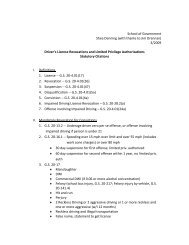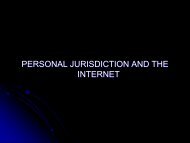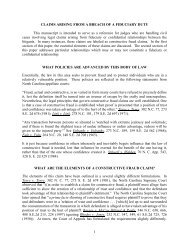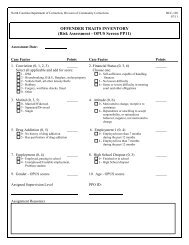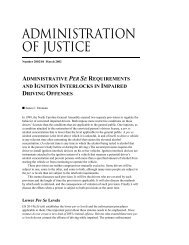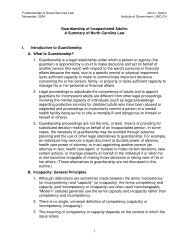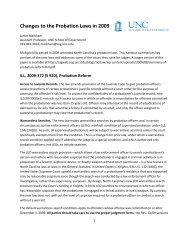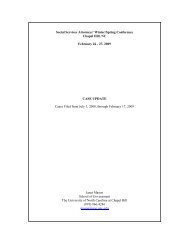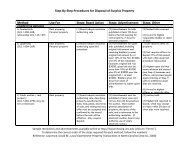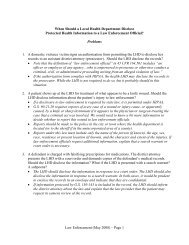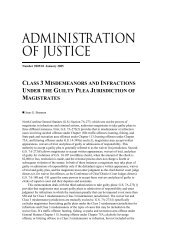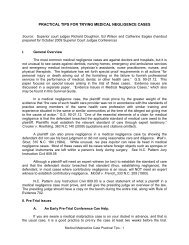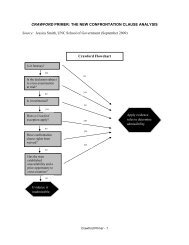Sample Forms and Colloquies
Sample Forms and Colloquies
Sample Forms and Colloquies
Create successful ePaper yourself
Turn your PDF publications into a flip-book with our unique Google optimized e-Paper software.
NOTICE TO ATTORNEYS CONCERNING JURY SELECTION<br />
Counsel are expected to familiarize themselves prior to trial with the<br />
provisions of G.S. 15A-1214 <strong>and</strong> related case law pertaining to jury selection.<br />
During the course of jury selection, counsel should anticipate that those provisions<br />
will be enforced, including, but not limited to the following:<br />
1. The purpose of the jury selection process is to provide reasonable<br />
opportunity for counsel to satisfy themselves <strong>and</strong> the people they<br />
represent that prospective jurors meet the qualifications required by law,<br />
can <strong>and</strong> will serve as fair <strong>and</strong> impartial jurors throughout the trial of the<br />
matter, decide the case based upon the evidence presented in the<br />
courtroom <strong>and</strong> follow the law as instructed by the court.<br />
2. Counsel should not attempt to use the jury selection process for purposes<br />
of:<br />
(a) Visiting with or seeking to establish rapport with the jurors;<br />
(b) Indoctrinating the jurors to a particular view;<br />
(c) Arguing the case during questioning; or<br />
(d) Asking what kind of verdict they would render under certain<br />
circumstances.<br />
3. General questions should be addressed to the jury panel as a whole <strong>and</strong><br />
counsel should seek to avoid undue repetition arising from asking the<br />
same questions to each individual juror. Counsel may address jurors<br />
individually when asking questions that apply only to that person,<br />
questions prompted by affirmative answers to general questions, or<br />
questions relating to unique personal experiences of that juror. State v.<br />
Phillips, 300 N.C. 678, 268 S.E.2d 452 (1980).<br />
4. Examples of improper questions from counsel during jury selection that<br />
will not be permitted include:<br />
(a) Hypothetical questions tending to “stake out” the juror or elicit in<br />
advance what a juror’s decision will be, given certain facts. State v.<br />
Vinson, 287 N.C. 326, 215 S.E.2d 60 (1975); State v. Hunt, 37 N.C.<br />
App. 315, 246 S.E.2d 159 (1978). Examples of improper hypotheticals<br />
include:<br />
(1) Asking a juror how he would weight a particular mitigating<br />
or aggravating circumstance. State v. Walls, 342 N.C. 1, 463<br />
S.E.2d 738 (1995);<br />
(2) “If you were to find that the defendant had previously been<br />
convicted of a murder, could you still follow the judge’s<br />
instructions…” State v. Robinson, 339 N.C. 263, 451 S.E.2d<br />
196 (1994);<br />
(3) "If I choose not to put on a defense, would you hold that<br />
against me…” State v. Blankenship, 337 N.C. 543, 447 S.E.<br />
727 (1994) as distinguished from “If the defendant chooses<br />
not to testify…”



